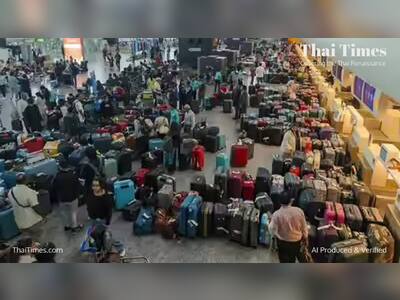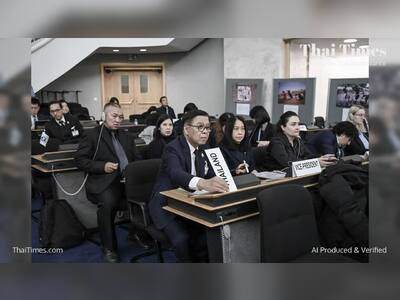Thailand Targets Luxury Tourism Growth with Niche Market Strategy
The country aims for a 10% annual boost in high-spending visitors by focusing on wellness, sports, romance, and personalized experiences.
The Tourism Authority of Thailand (TAT) has unveiled an ambitious plan to position Thailand as a premier luxury tourism destination.
By targeting niche markets such as wellness, sports, and romance, the country aims to achieve an annual growth rate of 8-10% in its luxury tourism sector.
A Growing Market
According to Jirawadee Khunsap, TAT’s deputy governor for products and tourism business, luxury tourism in Thailand is currently valued at 70 billion baht annually.
Key destinations for affluent travelers include Bangkok, Phuket, Chonburi (Pattaya), Krabi, and Koh Samui.
In 2023, these tourists spent an average of 77,693 baht per trip, staying between nine and ten days.
The strategy comes as Thailand faces heightened competition from regional rivals such as Japan, which surpassed Thailand in foreign tourist arrivals last year, as well as established luxury destinations like Singapore, Dubai, and the Maldives.
Despite this, Thailand’s extensive network of four- and five-star accommodations, premium services, and diverse natural and cultural offerings provide a strong foundation for growth.
Strategic Focus on Niche Markets
Jirawadee emphasized that Thailand’s competitive edge lies in its ability to offer high-quality experiences at a relatively lower cost compared to its regional counterparts.
The TAT plans to leverage this advantage to attract affluent travelers from major markets, including China, the United States, and the Middle East.
"Luxury tourism allows us to create tailored experiences that cater to the specific demands of these high-spending visitors," Jirawadee noted.
Thailand’s reputation for safety and warm hospitality further enhances its appeal to discerning travelers.
Short- and Long-Term Plans
In the short term (1-3 years), the TAT aims to host high-profile events such as international music festivals, sporting competitions, and fashion shows.
Partnerships with global luxury brands will create unique experiences to attract wealthy tourists.
Over the longer term (3-5 years), the focus will shift to offering highly personalized tour packages that incorporate wellness, art, and cultural attractions.
Enhancements to infrastructure, including upgrades to airports, yacht-friendly ports, public transportation, and luxury car rental services, are also planned to support the growing demand for premium travel.
Navigating Regional Competition
Thailand’s push into the luxury market comes as it grapples with increasing competition from other Asian destinations.
However, Jirawadee expressed confidence that Thailand’s combination of affordability, natural beauty, and cultural richness provides a distinct advantage.
"Thailand can offer unparalleled experiences that balance cost-effectiveness with world-class quality," she said.
By refining its tourism offerings and addressing the needs of high-spending travelers, Thailand hopes to cement its reputation as a leading global luxury destination, ensuring continued growth in the post-pandemic era.
By targeting niche markets such as wellness, sports, and romance, the country aims to achieve an annual growth rate of 8-10% in its luxury tourism sector.
A Growing Market
According to Jirawadee Khunsap, TAT’s deputy governor for products and tourism business, luxury tourism in Thailand is currently valued at 70 billion baht annually.
Key destinations for affluent travelers include Bangkok, Phuket, Chonburi (Pattaya), Krabi, and Koh Samui.
In 2023, these tourists spent an average of 77,693 baht per trip, staying between nine and ten days.
The strategy comes as Thailand faces heightened competition from regional rivals such as Japan, which surpassed Thailand in foreign tourist arrivals last year, as well as established luxury destinations like Singapore, Dubai, and the Maldives.
Despite this, Thailand’s extensive network of four- and five-star accommodations, premium services, and diverse natural and cultural offerings provide a strong foundation for growth.
Strategic Focus on Niche Markets
Jirawadee emphasized that Thailand’s competitive edge lies in its ability to offer high-quality experiences at a relatively lower cost compared to its regional counterparts.
The TAT plans to leverage this advantage to attract affluent travelers from major markets, including China, the United States, and the Middle East.
"Luxury tourism allows us to create tailored experiences that cater to the specific demands of these high-spending visitors," Jirawadee noted.
Thailand’s reputation for safety and warm hospitality further enhances its appeal to discerning travelers.
Short- and Long-Term Plans
In the short term (1-3 years), the TAT aims to host high-profile events such as international music festivals, sporting competitions, and fashion shows.
Partnerships with global luxury brands will create unique experiences to attract wealthy tourists.
Over the longer term (3-5 years), the focus will shift to offering highly personalized tour packages that incorporate wellness, art, and cultural attractions.
Enhancements to infrastructure, including upgrades to airports, yacht-friendly ports, public transportation, and luxury car rental services, are also planned to support the growing demand for premium travel.
Navigating Regional Competition
Thailand’s push into the luxury market comes as it grapples with increasing competition from other Asian destinations.
However, Jirawadee expressed confidence that Thailand’s combination of affordability, natural beauty, and cultural richness provides a distinct advantage.
"Thailand can offer unparalleled experiences that balance cost-effectiveness with world-class quality," she said.
By refining its tourism offerings and addressing the needs of high-spending travelers, Thailand hopes to cement its reputation as a leading global luxury destination, ensuring continued growth in the post-pandemic era.











